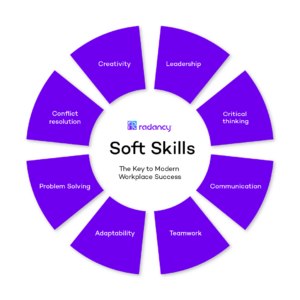In the modern workplace, soft skills are becoming increasingly important. While hard skills are necessary for specific technical tasks and positions, the role of soft skills – such as communication, teamwork, and time management – is becoming recognized as a key factor in the success of an organization. In the past, such skills were seen as being complementary to one’s technical skillset, but it is now evident that they are essential for professionals to effectively navigate and thrive. This article will delve deeper into the escalating importance of soft skills in the modern work environment, positing that their significance is at least equal to, if not greater than, that of technical abilities.
“The concept of ‘soft’ is losing its foothold in the workplace today … More and more, in the workplace I’m living in, I see worlds of gray. I don’t see just soft and hard. I see everyone needing the ability to act like humans and engage with people to get their jobs done.” – Summer Salomonsen, Head of Cornerstone Studios
Definitions
Hard skills form the foundation of professional expertise, they are teachable and measurable and can be gained through formal education, training, or work experience. Soft skills, on the other hand, characterize how a person interacts in his or her relationships with others. These include empathy, creativity, conflict resolution, leadership, and more.

The Rising Importance of Soft Skills
Today’s global work environment has extended beyond mere technical know-how. The focus has increasingly shifted towards skills that foster innovation, creativity, adaptability, and effective interpersonal interactions. Once undervalued, soft skills are now seen as indispensable, enabling professionals to effectively manage and lead teams, adapt to evolving environments, and communicate with stakeholders from diverse cultures and backgrounds.
Recent trends and reports support this shift in focus. For example, LinkedIn’s 2019 Global Talent Trends report indicated that an overwhelming 92% of HR professionals believe soft skills are either as important or more important than hard skills.[1] This change in perspective is a testament to the growing understanding that while technical skills can be taught and acquired, soft skills are integral to long-term success and are more challenging to develop and refine.
Communication Skills – The Heart of Workplace Efficiency
Effective communication involves more than just speaking or writing clearly. It encompasses the ability to convey ideas succinctly, listen actively, engage in constructive dialogues, and understand non-verbal cues. These skills are central to maintaining efficient workflows, fostering a culture of teamwork, and ensuring collaborative problem-solving, all of which are vital for organizational efficiency and success.
Google’s Project Aristotle serves as a significant example in this regard. The project, initiated to understand the dynamics of effective teams, discovered that the highest-performing teams were those with strong communication skills, particularly in aspects of psychological safety.[2] This finding underscores the critical role of open and effective communication in enhancing team performance and overall business outcomes.
Teamwork Skills – Together Everyone Achieves More
The concept of teamwork extends beyond mere collaboration. It involves the synergy of diverse individuals, each bringing unique skills and perspectives, working cohesively towards shared objectives. Effective teamwork capitalizes on individual strengths, fosters a sense of belonging, and cultivates an environment where collective goals take precedence over individual achievements. Empirical evidence supports the value of teamwork. A study by the Institute for Corporate Productivity revealed that high-performance teams could increase productivity by as much as 30%.[3]
Soft Skills are Essential
In addition to communication and teamwork, a range of other soft skills play a pivotal role in the professional sphere. These include problem-solving, adaptability, emotional intelligence, and leadership. Each of these skills is critical in its own right – for managing change, driving innovation, fostering a positive work environment, and leading teams towards achieving common goals.
The value of these additional soft skills is consistently highlighted in various research studies. For instance, the Society for Human Resource Management found that employers often prioritize soft skills such as problem-solving and adaptability when selecting job candidates.[5] This preference underscores the recognition that these skills are integral to navigating the complexities and challenges of the modern workplace.
Cultivating Soft Skills in the Workplace
Developing these essential soft skills requires concerted efforts by organizations. This can be achieved through comprehensive training programs, mentorship initiatives, and fostering a culture that values continuous learning, personal development, and emotional intelligence. Additionally, organizations can implement specific activities and workshops focused on enhancing communication, teamwork, and other soft skills.
An exemplary model in this context is Deloitte’s soft skills training program. The program is specifically designed to nurture emotional intelligence, leadership skills, and other interpersonal abilities. The results have been significantly positive, leading to improved teamwork, enhanced communication, and a workforce that is more adaptable and resilient to change.[5]
In 2020, Deloitte implemented an employee referral program. Utilizing recommendations from existing employees for new hires is an effective method to ensure a candidate’s compatibility with the team. This approach not only promotes a potential cultural fit but also indicates that the candidate likely possesses essential soft skills. Deloitte’s referral program earned them a Recruitment Academy Award in 2021.
Soft Skills Training and Other Solutions
One of the major challenges in developing soft skills is the increasing diversity of the workforce and the prevalence of remote working arrangements. These factors can create barriers to direct communication and impede the organic development of interpersonal skills, which are often best cultivated in person-to-person interactions.
To address these challenges, companies can adopt various strategies. These include implementing virtual team-building activities that foster a sense of community, utilizing collaborative communication platforms to bridge the physical gap, and offering tailored training programs specifically designed for remote work environments. Such initiatives can help maintain and even enhance the development of soft skills in a digitally connected world.
Another solution that is gaining traction is the use of aforementioned employee referrals for hiring. The alignment of a candidate’s values and behaviors with an organization’s culture is a critical aspect of the hiring process. Employees typically recommend individuals they trust and regard as valuable additions to the organization, as their own reputation is implicitly associated with the quality of their referral.
Final Thoughts
Throughout this article, the growing significance of soft skills in the modern workplace has been underscored. These skills, including but not limited to communication, teamwork, adaptability, and leadership, are essential for organizational success and should be valued on par with, if not more than, technical skills.
The current business landscape demands a renewed focus on soft skills development. It is imperative for businesses to invest in nurturing these skills. Doing so is not merely beneficial but essential for building a dynamic, adaptable, and successful workforce, ready to meet the challenges and opportunities of today’s professional world.
Sources:
[1] CommunicationsShareLinkedInFacebookTwitter, L. C. LinkedIn releases 2019 global talent trends report. LinkedIn releases 2019 Global Talent Trends Report. https://news.linkedin.com/2019/January/linkedin-releases-2019-global-talent-trends-report
[2] Cook, A. V., Griffiths, M., Anderson, S., Kusumoto, L., & Harr, C. (2020). A new approach to soft skill development. Immersive learning for human capabilities. URL: https://www2. deloitte. com/global/en/insights/topics/emerging-technologies/imme rsive-technologies-soft-skill-training. html.
[3] Oakes, K. (2023, December 13). Organizational Trust & The Productivity Predicament. i4cp. https://www.i4cp.com/productivity-blog/the-productivity-predicament
[4] Friedland, N. S., Allen, P. G., Matthews, G., Witbrock, M., Baxter, D., Curtis, J., … & Clark, P. (2004). Project halo: Towards a digital aristotle. AI magazine, 25(4), 29-29. Retrieved from https://centre.upeace.org/wp-content/uploads/2020/09/7.1-what-google-learnt.pdf
[5] Rockwood, K. (2021, August 21). In Search of Soft Skills. SHRM. https://www.shrm.org/topics-tools/news/all-things-work/search-soft-skills




















